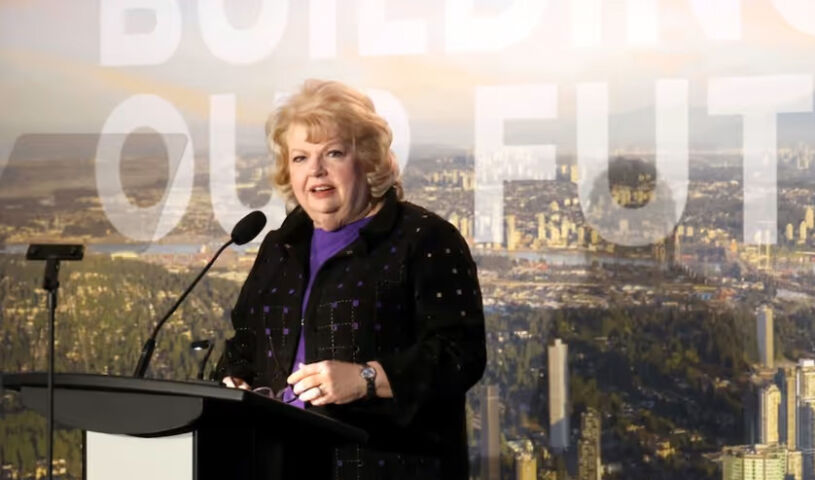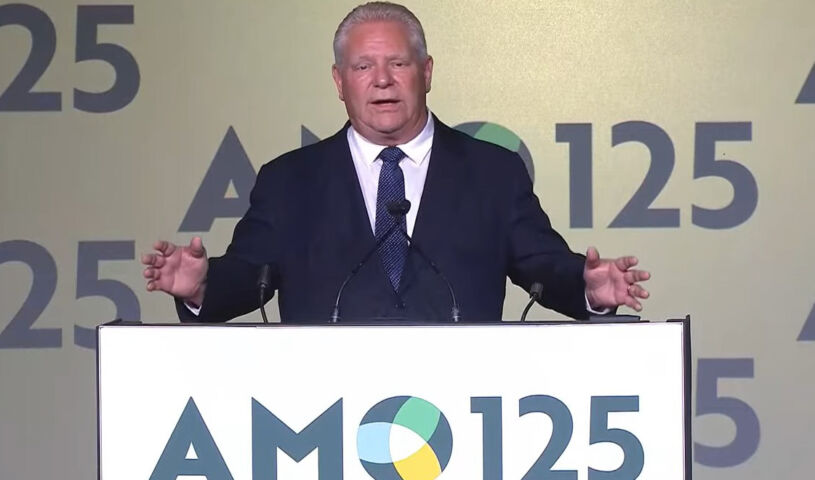Surrey to explore creation of city charter
 Mayor Brenda Locke recently tabled a motion at council directing staff to prepare a report on how to proceed in the development of a Surrey Charter. Photo: Brenda Locke on X.
Mayor Brenda Locke recently tabled a motion at council directing staff to prepare a report on how to proceed in the development of a Surrey Charter. Photo: Brenda Locke on X.
The mayor of Metro Vancouver’s second biggest city has said she wants it to have a charter. Surrey Mayor Brenda Locke recently tabled a motion at council directing staff to prepare a report on how to proceed in the development of a Surrey Charter.
City hall says the move aims to recognize Surrey’s rapid growth and unique needs, while providing greater autonomy for the city to govern itself.
“Surrey is a vibrant and dynamic city, and it’s time we have the legislative powers to match,” said Locke. “A Surrey Charter would give us the freedom to innovate and make decisions that are in the best interest of our residents and businesses.”
Charting a Path Forward
Surrey council approved Locke’s motion on July 22. It directs city staff to prepare a corporate report outlining the process for developing a Surrey Charter, including an assessment of the benefits and challenges, as well as potential models for implementation. This report will be presented to council at a future meeting.
The B.C. government has not indicated whether it would support the proposal for a charter or not. However, Minister of Municipal Affairs Anne Kang said the government is “committed to ensuring that Surrey has the right tools to help meet the needs of its residents.” She added that should the government receive a proposal to establish a charter, they would “review it carefully.”
Kang added that the ministry “remains committed to continuing to provide advice and support to local governments throughout the province, whenever needed. We’re always happy to hear from local governments about their ideas to help them better meet the needs of people in their communities.”
Population growth in particular was cited as a part of the rationale behind seeking a charter. Surrey’s population has grown rapidly in recent years as people from other parts of Metro Vancouver and elsewhere move to the city. Its population is expected to surpass Vancouver’s by 2029.
A news release from the City of Surrey said that population growth means “it is essential that the city has the legislative powers to match its scale and ambitions.” The statement said the proposed charter would grant the city greater control over key areas such as housing and building regulations, allowing council to make more decision.
“We are excited about the possibilities this could bring, from affordable housing options to new economic development opportunities,” Locke said. “Our goal is to position Surrey as a leader in the province’s future, and this charter would be a significant step toward achieving that.”
City Charters in B.C.
Surrey, like other municipalities in British Columbia, operates under the province’s Local Government Act. However, the act does not apply to the province’s largest city, Vancouver, which has its own charter.
The provincial statute establishing the charter was passed in 1953. It grants the city different powers than other communities have under the province’s Local Government Act. Under the charter, Vancouver council has the authority to pass bylaws on things like property sales, collection of certain taxes, approval of expenditures, enabling the city to take on debt, give grants, and hire and discharge employees.
The province enacted the Community Charter act in 2004. It’s meant to be a more flexible legislation designed to support local autonomy and provide municipalities with broader powers.
Municipal Policing Debate
Surrey’s move to establish a charter comes a few months after B.C. Public Safety Minister Mike Farnworth said a contentious transition to a municipal police force will go ahead. Locke is opposed to the transition and was elected in 2022 on a promise to cancel the move to a municipal police force and maintain the RCMP.
The transition away from the RCMP was first initiated by Locke’s predecessor, Doug McCallum, in 2018. However, Locke and others argued that transition to a municipal force would be too costly.
In April, Locke rejected the province’s offer of $250 million to help fund the policing transition, saying that doing so “would be to the detriment of our residents and overall public safety in Surrey.” However, ultimate authority over policing rests with the provincial government, and Farnworth said the transition would move forward.
“All of us want to move on with this, and I’m very pleased that that’s happening,” Farnworth said.
Surrey, B.C. Reach Agreement
In early July, the city and province signed the agreement. It means that every year until 2029, B.C. will give Surrey $30 million toward the cost of transitioning from the Surrey RCMP to the municipal police force. In addition, from 2029 to 2034, the province will also give Surrey up to $20 million a year to pay salary differences if Surrey police officer salaries are higher than those of RCMP officers. The transition is scheduled to end by 2026.
“Surrey city council has worked hard to ensure that the provincial government would support the police transition beyond its initial $150-million offer,” Locke said. “The new funds from the province will help to lessen the financial impact of the transition to Surrey taxpayers.”
The Surrey Police Service will now become the police of jurisdiction on Nov. 29, 2024.
Last October, Surrey launched a last-ditch legal challenge over the provincial government’s authority to order a transition. However, in May, the B.C. Supreme Court dismissed the city’s petition, confirming the province’s authority over municipalities and policing.
Records recently obtained by The Globe and Mail show that Surrey spent almost $1.3 million on legal fees, disbursements, and GST for the failed challenge. Locke called the money was “pretty well spent” and said the city’s legal challenge helped reach the $250-million agreement with the province. MW
✯ Municipal World Executive and Essentials Plus Members: You might also be interested in Sandeep Aujla’s article: Bold leadership: Evolving role of municipal leaders post-pandemic.
Ibrahim Daair is staff writer at Municipal World.
Related resource materials:


